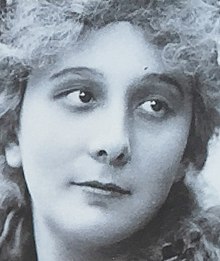Olga Pewny
Olga Pewny ( July 28, 1872 in Pancsova , Austria-Hungary - after 1940) was a Hungarian opera singer with a soprano voice . She belonged to the ensemble of the Metropolitan Opera in New York for a few years , was engaged in Darmstadt and Breslau and made guest appearances in Frankfurt am Main, Mannheim, Stuttgart and Wiesbaden as well as at the Bayreuth Festival . Her whereabouts after 1940 are unclear.
life and work
Olga Pewny attended the Raff'sche Conservatory in Frankfurt am Main , but her most important teacher was her older sister, Irene Pewny (1866–1916). She made her debut at the Leipzig Opera House in 1890 as Pamina in Mozart's Magic Flute , but then went to Paris to study with Jacques Bouhy . In 1893 she was engaged at the Metropolitan Opera in New York . She traveled to America with her sister Irene, made her debut as Venus in Wagner's Tannhäuser and initially remained committed to the Met for two seasons. Meanwhile, her sister took on engagements as a concert singer. In 1895 the sisters returned to Germany and separately accepted permanent engagements - Irene at the Stettin City Theater and Olga at the Darmstadt Court Theater . Olga Pewny also made her debut in Wagner's Tannhäuser in Darmstadt, but now as Elisabeth. In 1896 the singer made guest appearances in Stuttgart and Mannheim, in 1898 in Wiesbaden and Frankfurt am Main and again in Stuttgart and Mannheim. She then returned to the Met for two seasons. She also took over Tannhäuser-Elisabeth in New York, but she could also be seen and heard in Manhattan as Marzelline and the maid Anne, and in numerous smaller roles on all four evenings of Richard Wagner's Ring des Nibelungen .
From 1900 to 1904 she was part of the ensemble of the Wroclaw City Theater . In the summer of 1902, Olga Pewny was invited to the Bayreuth Festival . There she took over Freia in Rheingold , Ortlinde in Walküre and two smaller roles in Parsifal . She was also a sought-after concert soprano and sang the soprano solo in Beethoven's Ninth in Germany and North America. It was heard in the legend of St. Elisabeth by Franz Liszt and in a number of other choral orchestral works. In the United States she sang under the direction of Walter Damrosch , Emil Paur and Anton Seidl .
In 1904 she married the Breslau attorney Jacques Schaefer and gave up her stage career. In the following years she worked as a singing teacher. From 1933 onwards she was in massive danger due to her Jewish origins. Her husband died in February 1937. Her name appears on the "List of Jews, Mixed-race Jews and Jewish Verses" excluded from the Reichsmusikkammer, even though she had ended her career almost thirty years before the National Socialists took office. It was also mentioned in volume 2 of the Lexikon der Juden in der Musik , published on behalf of the Reich leadership of the NSDAP in 1940. According to Kutsch / Riemens, the singer “(probably) still lived in Breslau in 1940”.
Her further life after 1940 is unknown.
rank
Ludwig Eisenberg characterizes the artist's work as follows:
“Her splendid, technically exemplary singing is pervaded by pure, simple feeling. She does her job with spirit and grace and at the same time with a clear, soulful voice. Also - explains the criticism - the characters she embodies are raised far beyond the everyday. "
Eisenberg also praises "its youthful organ", the "excellent training" and the "elegant style of presentation" with which Pewny "impresses" especially in Mozart and Wagner operas.
repertoire
Gounod :
Mascagni :
Mozart :
Nicolai :
|
Wagner :
Weber :
|
Audio documents
- Olga Pewny is represented on the sampler Bayreuth Voices 1901-1906 with the Berceuse Cachés dans cet asile from the opera Jocelyn , op. 100 by Benjamin Godard .
Commemoration
In the park near the Bayreuth Festival Hall , a memorial plaque with a text from the book Silent Voices was erected.
Individual evidence
- ↑ Breslauer Juedisches Gemeindeblatt, No. 4 1937, p. 6
- ^ Ludwig Eisenberg: Large biographical lexicon of the German stage in the 19th century, P. List, Leipzig 1903, p. Page 765
literature
- Karl-Josef Kutsch , Leo Riemens : Large singer lexicon . Fourth, enlarged and updated edition. KG Saur, Munich 2003, Volume 4, pp. 3641f
Web links
- Olga Pewny in the Bavarian Musicians' Lexicon Online (BMLO)
| personal data | |
|---|---|
| SURNAME | Pewny, Olga |
| ALTERNATIVE NAMES | Schaefer-Pewny, Olga; Schaefer, Olga |
| BRIEF DESCRIPTION | Hungarian opera singer (soprano) |
| DATE OF BIRTH | July 28, 1872 |
| PLACE OF BIRTH | Pancsova |
| DATE OF DEATH | after 1940 |

